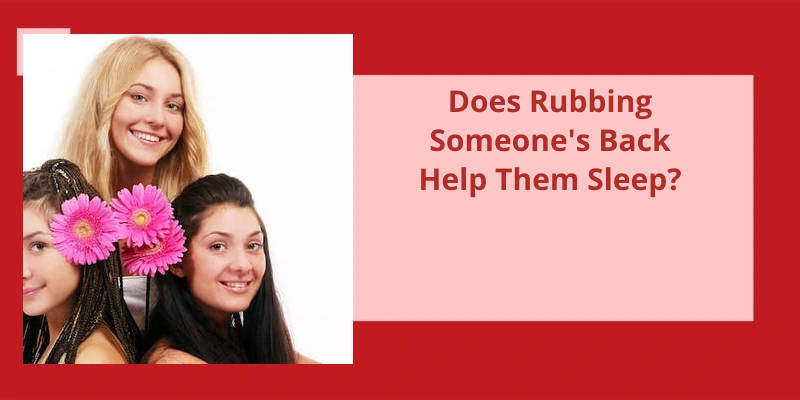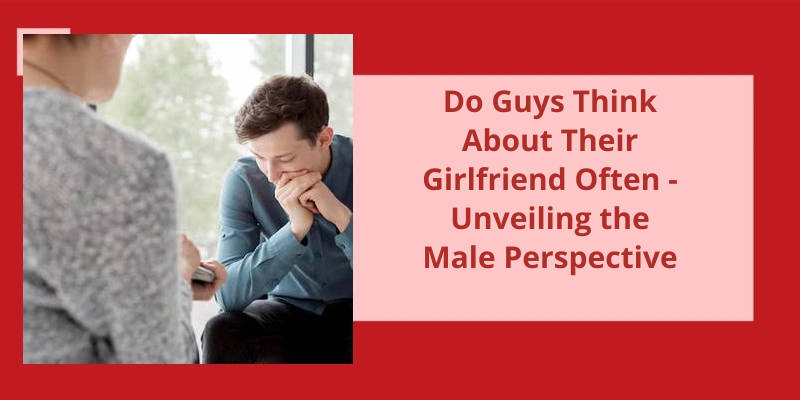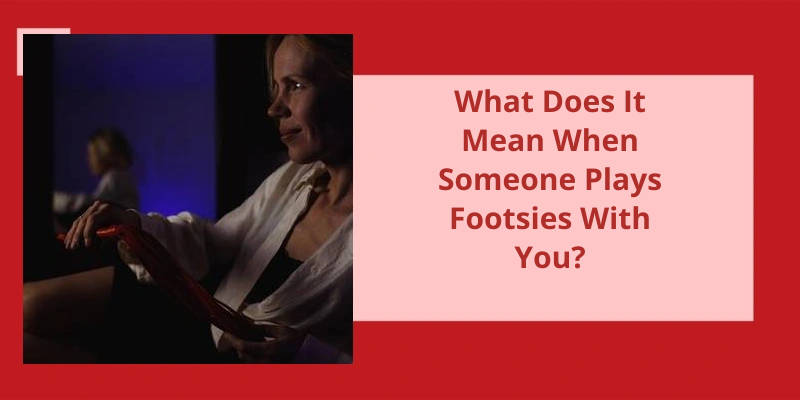One of the simple and time-tested methods to promote relaxation and enhance sleep is through the act of rubbing someone's back. This gentle and soothing gesture can be performed after a warm bath, right before bedtime, after repositioning, or simply to help someone unwind. The benefits of back rubs extend beyond simply providing comfort and encouragement. They’ve been shown to relax muscles, increase blood circulation, and ultimately aid in inducing a restful slumber. The duration of these back rubs typically lasts for around 5 minutes, making it an easily accessible and quick solution for those seeking a peaceful night's sleep.
Does Rubbing Back Help Sleep?
Research has shown that a simple back rub can have a significant impact on a persons sleep. In a recent small study published in the Journal of Holistic Nursing, women who received a slow stroke back massage for just three minutes experienced an additional 36 minutes of sleep compared to those who didn’t receive a massage. This finding highlights the potential benefits of this simple technique in improving sleep quality.
Furthermore, the act of receiving a back rub may also release endorphins, which are natural painkillers and mood enhancers. This could further enhance the relaxation response and contribute to a better sleep experience. In addition to the physical benefits, the act of giving or receiving a back rub can also foster a sense of connection and intimacy, creating a soothing environment that promotes sleep.
Additionally, individual experiences and preferences may vary, so it’s important to experiment and find what techniques work best for each person. However, incorporating a gentle back rub into a bedtime routine may be worth trying for those seeking to improve their sleep quality.
Benefits of Back Rubs for Different Age Groups: The Article Could Explore the Potential Benefits of Back Rubs for Different Age Groups, Such as Infants, Children, Adults, and the Elderly.
- Improved sleep for infants
- Promotion of bonding between parent and child
- Enhanced motor development in infants
- Reduction of stress and anxiety in children
- Improved circulation and flexibility in adults
- Relief from muscle tension and pain in adults
- Increased relaxation and stress reduction in the elderly
- Improved joint mobility in the elderly
- Promotion of overall well-being and relaxation in all age groups
Research has shown that back rubs have a profound impact on our well-being, releasing the hormone oxytocin and inducing feelings of contentment while reducing stress and anxiety. This natural response to human touch plays a crucial role in providing comfort and relaxation.
Why Are Back Rubs So Comforting?
Back rubs have long been known for their comforting and relaxing effects. But what exactly makes them so soothing? Recent studies have shed some light on this phenomenon. In one study, participants who received a back rub were found to have significantly higher levels of oxytocin compared with control subjects who merely rested quietly. Oxytocin, often referred to as the “love hormone,” is known to evoke feelings of contentment and alleviate feelings of stress and anxiety. It’s believed that the release of oxytocin during a back rub contributes to the calming and comforting sensations experienced by the individual.
Furthermore, the physical act of rubbing someones back may also play a role in the perceived comfort. The gentle pressure and repetitive movements stimulate the sensory nerves in the skin, activating the bodys relaxation response. This stimulation can help to reduce muscle tension and increase blood circulation, leading to a sense of physical and mental relaxation. Additionally, the rhythmic nature of a back rub may encourage deep breathing, further promoting relaxation and aiding in the induction of sleep.
Touch is a powerful form of communication and connection, and it’s been shown to have numerous positive effects on both physical and mental well-being. The physical contact and warmth provided during a back rub can help to create a sense of safety, comfort, and intimacy.
It’s important to listen to your body and find what works best for you. Whether it’s a back rub, a warm bath, or another relaxation technique, finding ways to unwind and de-stress before bed can greatly improve the quality of your sleep.
The Impact of Back Rubs on Muscle Tension and Blood Circulation
- Back rubs can help decrease muscle tension.
- Back rubs can improve blood circulation.
- Regular back rubs may lead to reduced muscle soreness and stiffness.
- Back rubs are believed to promote relaxation and stress relief.
- Improved blood circulation can enhance the supply of oxygen and nutrients to muscles.
- Back rubs may alleviate muscle knots and tightness.
- Enhanced blood flow can aid in the removal of toxins and waste products from muscles.
- Back rubs have been reported to improve flexibility and range of motion.
- Regular massages may contribute to better overall muscle health and reduced risk of injuries.
- Back rubs are often used as a complementary therapy in the management of muscle-related conditions.
Source: Why is it comforting when someone rubs your back or puts …
In addition to Swedish massage, other types of massages, such as scalp and facial massages, can also be beneficial for relieving stress and tension. The muscles in the face and head can hold a surprising amount of tension, making these specialized techniques particularly effective in promoting relaxation.
What Type of Massage Is Best for Sleep?
The gentle, long strokes used in Swedish massage can help to calm the nervous system and promote a sense of deep relaxation. This can be especially helpful for individuals who struggle with anxiety or insomnia, as it helps to reduce tension and promote restfulness. Swedish massage also focuses on improving circulation, which can aid in the delivery of oxygen and nutrients to the bodys tissues, promoting overall health and well-being.
Scalp and facial massages can also be beneficial for promoting sleep. The muscles in the face and head can hold a lot of tension, which can contribute to feelings of stress and anxiety. By gently massaging these areas, the tension can be released, helping to relax the mind and body. Additionally, scalp and facial massages can stimulate the release of endorphins, which are natural painkillers and mood enhancers. This can further promote a sense of relaxation and well-being, making it easier to fall asleep and stay asleep throughout the night.
Deep tissue massage, for example, can help to release chronic tension and knots in the muscles, allowing for greater relaxation and ease. Thai massage, which incorporates stretching and acupressure, can help to release energy blockages and promote a greater sense of balance and calm. It’s important to note, however, that individual preferences and needs may vary, and it’s always best to consult with a trained massage therapist to determine the most appropriate massage technique for your specific sleep concerns.
The Science Behind Massage and Sleep: Delving Into the Physiological Mechanisms by Which Massage Promotes Sleep and Relaxation.
Massage has been used for centuries as a method to promote relaxation and improve sleep. Recent scientific studies have shed light on the physiological mechanisms behind these beneficial effects.
When you receive a massage, multiple factors contribute to it’s sleep-inducing properties. Firstly, massage triggers the release of endorphins and serotonin, which are neurotransmitters associated with feelings of relaxation and well-being. This helps to lower stress and anxiety levels, allowing you to unwind and prepare for sleep.
Furthermore, massage stimulates the parasympathetic nervous system, which is responsible for the body’s rest and digest response. This leads to a decrease in heart rate, blood pressure, and cortisol levels, promoting a state of calmness and easing you into sleep.
Additionally, massage increases blood flow and circulation, delivering more oxygen and nutrients to your muscles and tissues. As a result, any tension or discomfort in your body is alleviated, helping you achieve a more comfortable and restful sleep.
Overall, the combination of these physiological responses brought on by massage contributes to a deep sense of relaxation and improved sleep quality. So, if you’re struggling with sleep, receiving a massage may indeed help you achieve a more restorative and peaceful night’s rest.
However, it’s important to note that not all back rubs are necessarily intimate in nature. There are various contexts and situations in which a back rub can be offered or received without romantic intentions. Communication and consent play a key role in determining the level of intimacy involved in such actions.
Is a Back Rub Intimate?
Second case, he doesn’t really care about you, but he knows this backrub is a way to quietly invade your space and assert control. Rubbing someones back can be a comforting and soothing gesture, especially when done in a non-sexual and platonic manner. However, it can also be seen as a more intimate act between two people who share a close bond, such as romantic partners or close friends.
The context in which the back rub occurs is crucial in determining it’s level of intimacy. If the back rub is initiated without consent or in a non-consensual manner, it can be considered a violation of personal boundaries and an invasion of privacy.
Furthermore, the intention behind the back rub also plays a significant role. If someone is offering a back rub as a caring and loving gesture, without any ulterior motives, it can be a wonderful way to promote relaxation and sleep. However, if the intention is to manipulate or exploit the recipient, the act becomes unethical and can cause discomfort and unease.
Ultimately, whether rubbing someones back helps them sleep or not depends on the individual. Some people find physical touch incredibly soothing and relaxing, which can lead to better sleep. Others may not find it as effective or may even feel uncomfortable with a back rub. It’s important to respect each persons boundaries and preferences when engaging in any physical contact.
Cultural Perspectives on Physical Touch: Explore How Different Cultures View Physical Touch, Including Back Rubs, and How This Can Influence Perceptions of Intimacy.
There’s a wide range of cultural perspectives on physical touch, including the act of rubbing someone’s back. Different cultures have varying views on physical touch and it’s role in intimacy. In some cultures, back rubs and other forms of physical touch are seen as nurturing and comforting, which can help promote relaxation and restful sleep. However, it’s important to note that cultural norms and personal boundaries around physical touch can vary greatly. What may be considered acceptable or appropriate in one culture may not be the same in another. Therefore, when offering a back rub or any form of physical touch, it’s essential to respect individual preferences and cultural differences.
Conclusion
So, the next time you or someone you know is struggling to fall asleep, consider the power of a gentle, soothing back rub as a natural and effective way to induce rest and relaxation.






